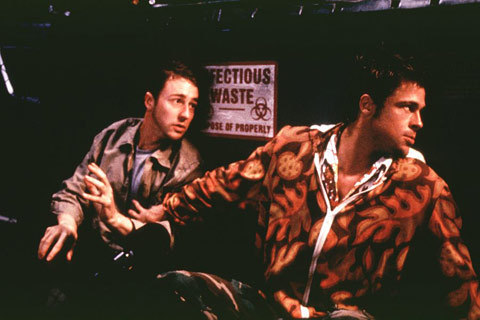Dir. David Fincher
Starring: Edward Norton, Brad
Pitt, Helena Bonham Carter, Meat Loaf
“The first rule of Fight Club is: you do not talk about Fight Club.
The second rule of Fight Club is: YOU DO NOT TALK ABOUT FIGHT CLUB!”
This could be a short review.
The unnamed Narrator (Edward
Norton) is a victim. He works a good job at an automobile company, assessing
faults in their cars. He goes where he is told and toes the company line. He
fills his apartment with IKEA furnishings. He has a very decent stereo and a
wardrobe that is getting towards very respectable. His life is lived by other
peoples’ rules – do this, say that, buy these. He is 30 now and knows the next
thing expected of him in the Game of Life is marriage and children. He never
makes any decision for himself and never takes any responsibility for his
actions. He cannot even sleep at night.
Then he meets Tyler Tyler Tyler Tyler
But then something comes between
them. Tyler Tyler tells the Narrator to never talk about him with
Marla; in return the Narrator begins to suspect that Tyler Tyler Tyler Tyler
The film, then, essentially comes
down to a battle for control, between the tyrannical Tyler and the beaten-down
Narrator, over the organisation they created together. Tyler
gets stronger as the Narrator gets weaker; as soon as the Narrator is absent or
asleep Tyler Tyler
 |
| Living off the fat of the land: The Narrator follows Tyler's lead |
There are certain movies – like American Flyers – that one cannot help
but watch without thinking “This is so ‘80s”. I have always said that while you
can get ‘’80s movies’, ‘’70s movies’ and so on, you never really get ‘’90s
movies’. I take that back. Fight Club
is a ‘90s movie. It has a late ‘90s cod-philosophy. There is a resentment about
how the world has turned out, a world of advertising selling consumerism. Brands
are all over the place: Calvin Klein, Volkswagen Beetles, IBM. We see the
Narrator on the toilet with his trousers around his ankles flicking through
what we at first assume to be a pornographic magazine but instead turns out to
be the IKEA catalogue. Allegedly there is a Starbucks coffee cup in every
single scene of the film. And then there is a reaction against this, an anti-capitalist,
anti-consumerist anger like that witnessed at Seattle Tyler
At the same time the styling, right
from the opening computer-generated speed tour of the brain’s synapses, through
the typeface of the titles and the pumping Dust Brothers soundtrack,
effectively took me back to my time at university when I first saw the film. I
could not even tell you whether Brad Pitt’s hipster-cool look with his leather
jacket, tank top and tinted sunglasses merely reflected the age or served as
pop-culture inspiration for it. Ed Norton’s drab washed-out shirts and Helena
Bonham-Carter’s messy hair and chunky heels were definitely the former however.
What have I learnt about Delaware
Assuming this is Delaware Tyler ’s business card are Wilmington , Delaware Wilmington Wilmington ,
Delaware
But as I say, it is seriously
scuzzy. The streets are perpetually rain-slick, the roads lined with self-help
groups in church halls and neon-fronted cinema marquees, grand buildings
sub-divided into flats or left to collapse through rot and mould. A cityscape
has not looked so horrific since Taxi
Driver.
Can we go there?
The film might be sort-of set in Delaware , but it was not filmed there; the good burghers
of Delaware Wilmington – even
though the city referred to on Tyler ’s business
card and in the news clippings seems to be called ‘Bradford ’
instead.
The film was actually shot in
many locations in and around Los Angeles , with
most of the interiors being created at the 20th Century Fox Studios
in Century City Wilmington
however – Wilmington , California Los Angeles Harbour 240 N Neptune Avenue 4371
Melrose Avenue 310 S Van Ness Avenue Tyler South Grand Avenue
Overall Rating: 4/5

Nice article. Very useful article about the movie.
ReplyDeletehttp://www.celebswear.com/products/Brad-Pitt-Fight-Club-Jacket-.html
brad pitt fight club jacket
ReplyDeleteFight club is really a unique fighting movie
Fight Club Brad Pitt Red/White Mayhem Jacket is really a unique fighting movie.
ReplyDeleteFire the floor wearing this super smart and elegant Birds of prey jacket. Pick your desired movie costume from famousmoviejackets.com at amazing prices.
ReplyDeleteFire the floor wearing this super smart and elegant Birds of prey jacket. Pick your desired movie costume from famousmoviejackets.com at amazing prices.
ReplyDelete
ReplyDeleteI found your documents very interesting
Leather shirts
Leather Pants